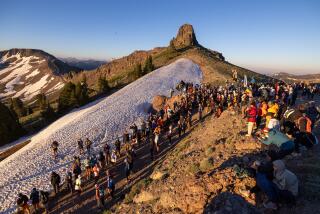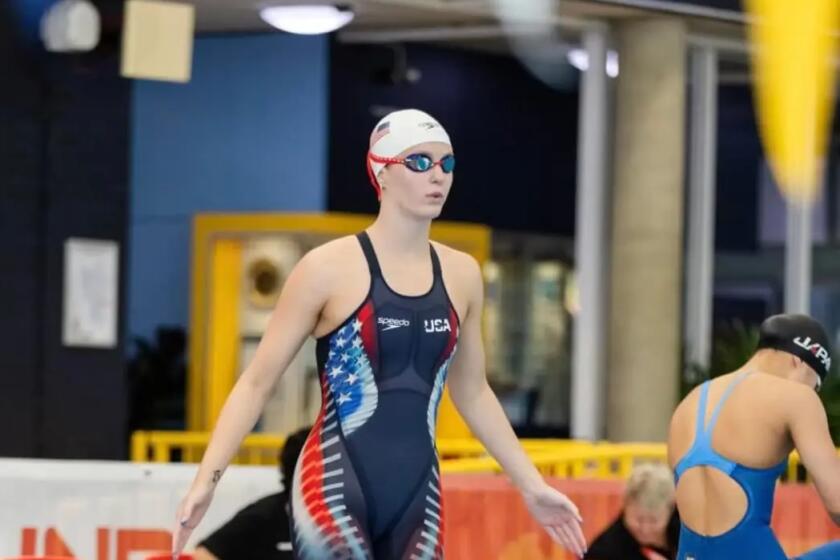Ready to Roll : Thousand Oaks cyclist prepares for grueling 2,930-mile race across the country.
- Share via
Think of Steve Born on Saturday morning. He’ll be in Irvine, pedaling.
Think of him again on Sunday. By then, he’ll probably be in Arizona, sleepless and still pedaling. Monday, Tuesday and the rest of the week: pedaling, pedaling and more pedaling, through southern Colorado, Texas and beyond.
Born, a 32-year-old sound effects editor who lives in Thousand Oaks, is one of 36 long-distance bicyclists expected to begin the 10th annual Race Across America (RAAM) in Orange County on Saturday morning.
“It’s an extreme challenge, and it requires everything you have,” Born said recently, relaxing after an easy 50-mile morning ride. “It makes me tap into things that most people wouldn’t even dream of exploring.”
This year’s course stretches across 2,930 miles and concludes in Savannah, Ga. The clock never stops, and every racer sleeps as little as possible. If past results are a fair indicator, the winner will cross the country in nine days, sleeping no more than two hours nightly along the way. Most of those who start will not finish.
By all accounts, the race is one of the most demanding sporting events in Western civilization. By Born’s estimate, it is “the most difficult athletic contest on the planet.”
He says he can’t resist the challenge, and gleefully explains his plans for a liquid diet, intravenous dietary supplements, massages while he sleeps and daily blood tests to check his potassium levels. The key to his strategy this year: For the first 42 hours of the race, he’s not going to rest.
“This race really models life itself to me, and it really identifies the kind of person I am,” Born said.
The race was devised 10 years ago by John Marino, a long-distance bicyclist in Orange County whose best cross-country time was 12 days. Marino, a 42-year-old contractor, takes time off to arrange the race every year, and is quick to note that for all its strenuousness, no major injuries have been reported.
Last year’s winner, Bob Forney of Denver, finished in eight days, 11 hours and 26 minutes.
This year, Marino expects 32 solo bicyclists (28 men, four women), plus a two-man tandem bike team and a man-woman tandem team competing in separate categories. More than half of the riders, Marino said, have competed before in the cross-country race.
Veterans and rookies alike pay $500 for the chance to race. Those who complete the route within 48 hours of the winner get recognition as official finishers. The cash prizes amount to less than the cost of a competition bicycle. Full physical recovery from the race--blisters, strains, saddle sores--can take months.
Born’s sponsor-seeking brochure takes note of such details, and concludes that the cyclist “could really use some professional help.”
Born, who is single, grew up in Wisconsin, Van Nuys and Thousand Oaks, where he has lived since fourth grade. He settled on a career in sound editing after several years at Moorpark College. His biking career began about 1980, an occasion he describes in confessional tones.
“I smoked cigarettes and I weighed over 200 pounds,” he said. “I woke up one morning and looked at myself.”
Born quit smoking cold turkey and soon embarked on his first long-distance ride, a solitary voyage from Oregon to Los Angeles. Many miles followed. Six years later, he heard about the Race Across America, and set about qualifying.
In 1988, he entered the race and completed a 3,100-mile journey from San Francisco to Washington in 10 days, 20 hours and 58 minutes. That was good enough for ninth place, despite the mid-journey resignation of his massage therapist and wrong turns in Nevada, Indiana and West Virginia.
While out on the road in that race, he promised himself never to attempt it again. Once he finished, he immediately started thinking about how he would prepare the next time.
In 1989, Born worked on the support crew of a friend’s RAAM effort. In 1990, he was too busy with personal and professional obligations. But this year, he took six months off from work and sank about $8,000 into training and equipment, all for the chance to suffer inordinately for about a week and a half.
At 5 feet, 10 inches tall, he weighs in at 178 pounds, and estimates that just 4% of his body weight is fat. For weeks, he trained at high altitudes, riding up to 900 miles weekly near Lake Tahoe to increase his endurance. Even so, he said, there’s no telling what could happen once the race is on.
“Four or five days out on the road, the field is so spread out that you don’t see anybody,” Born said. “You can forget you’re in a race. You’re in Kansas and there’s a good 20-m.p.h. head wind. . . . By this time you’ve only had six or eight hours of sleep in four days, and it’s easy to start making excuses to get off the bike for a while.”
During one hourlong stretch in 1988, Born recalled, he got off the bike 10 times to go to the bathroom. Other riders have reported startling mood swings, frog hallucinations and conversations with deities.
“That, hopefully, is where your crew comes in,” Born said. “They have to be little psychiatrists in the support vehicle, charting all your mood swings. . . . It takes a real strong individual to get out of that support vehicle and talk you back onto that bike.”
Born’s crew this year includes his father, his mother, three brothers, a cousin, a doctor and two friends. One crew member will serve as massage therapist, one will serve as bicycle mechanic, one will navigate. They’ll travel by motor home and Volkswagen van, staying close to Born after dark. A loudspeaker will blare music to inspire him.
Every 60 to 90 minutes, Born will sip a pack of chocolate-flavored Ultra Energy, a liquid food developed in 1986 to provide amino acids, vitamins, and minerals. Every night, the team physician will draw blood and analyze it. If he’s low in something, he might get an intravenous supplement during his nap and massage. He may also occasionally nibble on rice cakes and bread.
The meals, the medical precautions, the mileage--it won’t be easy. But by Born’s reasoning, it can’t be any harder than the last time he tried this.
In 1988, the route was 150 miles longer and, unlike this year’s, led over the Appalachian Mountains.
“They’re not as long as the Rockies, but they’re a hell of a lot steeper,” Born said. “They’re straight up. And after you’ve been out seven or eight days, that’s a hell of a way to finish a race.”
This year, Born and his competitors will follow a more southerly path through Texas, Louisiana, Mississippi, Alabama and Georgia.
“I would imagine a lot of people will be in Texas for three days,” Born said. “It’s gonna be hot and sticky.”
UP CLOSE STEVE BORN
Age: 32
Residence: Thousand Oaks
Vocation: Motion picture sound editing
Avocation: Long-distance bicycle racing
Body Fat: 4% of 178 pounds
Ambition: To ride his bicycle from Irvine to Savannah, Ga., faster than anyone else in the Race Across America
Explanation: “It’s an extreme challenge, and it requires everything you have. . . . It makes me tap into things that most people wouldn’t even dream of exploring.”
More to Read
Go beyond the scoreboard
Get the latest on L.A.'s teams in the daily Sports Report newsletter.
You may occasionally receive promotional content from the Los Angeles Times.











